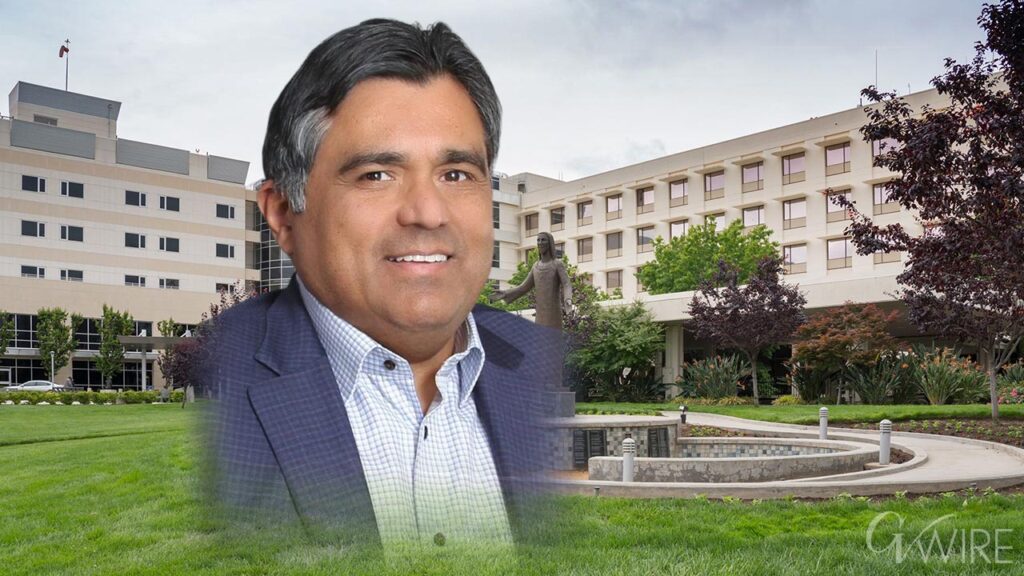Share
|
Getting your Trinity Audio player ready...
|
At six feet, four inches, Kris Kuyper is the tallest weathercaster in Fresno.
“I feel the rain first,” he joked.
Kuyper made his debut Monday night as the new meteorologist for KMPH Fox 26.
The Santa Barbara native and UC Davis graduate is nearing 30 years on the air. His career has taken him to Grand Junction, Colorado; Bakersfield; Anchorage; and three stints in Chico, where he most recently worked at KNVN/KHSL in 2019. He spent the last few years in real estate.
“I’m a better meteorologist that I am a real estate agent. So I decided to go back in TV,” Kuyper said. “I’ve got a lot of experience in the Central Valley. So I feel very comfortable with the weather patterns of the Central Valley. So it seemed like a natural fit for me.”
Kuyper also wanted to close to his mother, who lives in the Santa Barbara County town of Solvang.
Among other highlights of Kuyper’s career — carrying the Olympic torch in Sacramento in the run up to the 2002 Winter Games in Salt Lake City; working for Butte County, and testifying to a grand jury during the 2020 Camp Fire investigation; and son of an aerospace engineer who worked on the moon-bound Apollo program.
A new highlight for Kuyper, meeting morning weather anchor Kopi Sotiropulos.
“He’s quite the personality. He’s quite the legend,” Kuyper said.
Kuyper replaced longtime weatherman Kevan Ramer, who left in February, returning home to Alabama.
FOX26 News welcomed the newest member of the FOX26 family on Friday during Great Day. Kris Kuyper begins his new career as our new Chief Meteorologist.https://t.co/rmjGTNKJjU
— FOX26 News (@KMPHFOX26) March 31, 2023
Online Publication Looking for Editor
The digital publication Fresnoland is seeking a new editor.
With an agenda to “making policy public, investigating systems, not symptoms – and building a sense of community along the way,” Fresnoland is funded by the James Irvine Foundation, Chan Zuckerberg Foundation, James B. McClatchy Foundation, and the Central Valley Community Foundation among other nonprofits.
Danielle Bergstrom, the founder of Fresnoland, worked for CVCF CEO Ashley Swearengin when the latter was Fresno’s mayor.
Fresnoland says that it is independent of its donors.
The position starts at $84,000 with 20 vacation days. Be prepared to pick a community you represent when filling out the application. A question asks “Do you identify with any groups that are historically underrepresented in journalism?” Decline to state is not an option.
Its previous editor is leaving for another statewide publication.
For comparison, the Fresno Bee is also looking for a senior editor. The pay range is $140,000-$160,000.
Grizzlies Turn to AI
As Ben Hensley of The Business Journal wrote, the Fresno Grizzlies have turned to artificial intelligence to write post-game stories.
“Tonight’s article was written by ChatGPT,” the email version of the wrap-up said.
The purpose, Grizzlies communications director Stephen Rice said, was to help save staff time. Rice is also the team’s lead broadcaster this season.
The story carried the basic facts, and at times, read like it was written by a computer. Rice said human eyes check the story before being sent out.
The Grizzlies’ home opener is Tuesday night, April 11. First pitch is scheduled for 6:50 p.m.
(Disclosure: I work as a Grizzlies official scorekeeper, paid by the team.)


















